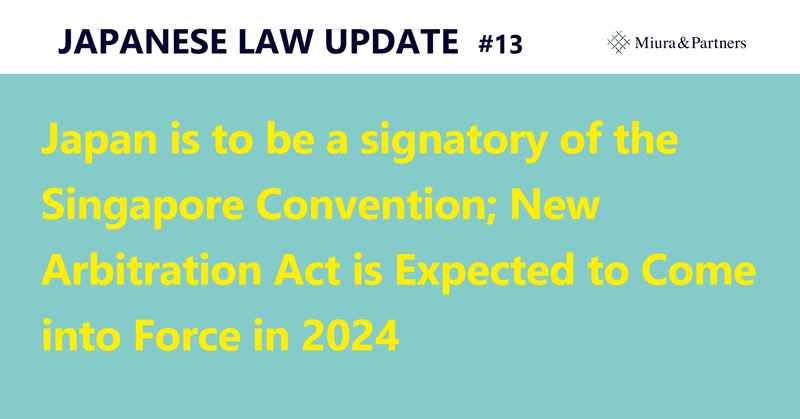
Japanese Law Update #13: Japan is to be a signatory of the Singapore Convention; New Arbitration Act is Expected to Come into Force in 2024
This piece is the follow-up for the Japanese Law Update #9: New Reforms for Enforcing Mediation Settlement Agreements in Japan, and Japanese Law Update #1: Japanese Authorities Issue Draft Proposals for the Reform of International Arbitration and Mediation.
1. Japan is to be a signatory of the Singapore Convention
On June 9, 2023, the Japanese legislative body (the “Diet”) approved that the Japanese government will sign the UN Convention on International Settlement Agreements Resulting from Mediation (the “Singapore Convention”). With its arrival in 2020, international mediation has been also attracting increasing attention in Japan. In April 2023, the Diet passed the bill to implement the Singapore Convention into domestic law to prepare that Japan is to be a signatory of the convention. The new law will come into force on the date on which the Singapore Convention will enter into force for Japan.
The new law provides an enforcement process for settlement agreements resulting from international mediation before Japanese courts. In relation to domestic mediation, another new legislation covers the process to enforce the settlement agreements resulting from certain types of domestic mediation. The new law indicates that Japan will declare a reservation pursuant to Article 8.1.b of the Singapore Convention, meaning that mediated settlement agreements will be enforceable only when the parties to such agreements agree to be covered by the convention.
2. Modernizing the Arbitration Act
Japan’s Arbitration Act was implemented in 2004. Merely two years later, the UNCITRAL Model Law on International Commercial Arbitration 1985 was amended. Since then, there have been discussions on amending the Arbitration Act to modernize the rules for years, a bill to reform the Arbitration Act was finally passed in April 2023. The amendments are expected to come into force in 2024.
As suggested in the draft proposals by the authorities earlier, Japanese courts are to recognize and enforce interim measures issued by international arbitral tribunals once the amendments come into force. The change will allow, among other things, the parties of arbitration to secure assets to be subject to execution based on the final arbitral award in advance, or to preserve evidence to be submitted in the arbitration process.
Under the Arbitration Act, which is currently in force, a party of arbitration enforcing an arbitral award written in a language other than Japanese must provide the court with a Japanese translation of the award. Once the amendments are implemented, Japanese courts have discretion to proceed with an award or an interim measure issued in languages other than Japanese and to waive the need for these documents to be translated into Japanese. This change would accelerate the enforcement process before Japanese courts.
Author
Yoshie Midorikawa, Partner
Yoshie Midorikawa has extensive experience in complex disputes and arbitration. Having worked with leading law firms in Japan and Singapore, she has handled parallel proceedings across multiple jurisdictions as well as domestic disputes before Japanese courts. She has also served as a board member of listed companies in Japan, improving their corporate governance. Her deep understanding of the civil law system, her working experience in international environments, including common law jurisdictions, and her knowledge of business, enable her to bring practical and nuanced legal solutions to international businesses. She is listed among “Next Generation Partners (Dispute Resolution)” by Legal500 Asia Pacific 2023, “Best Lawyers in Japan (Litigation)” in the editions of 2021 to 2024, “Best Lawyers in Japan (Corporate Governance & Compliance)” in the edition of 2023 and 2024, “Best Lawyers in Japan (International Arbitration)” in the edition of 2024 by Best Lawyers.
この記事が気に入ったらサポートをしてみませんか?
